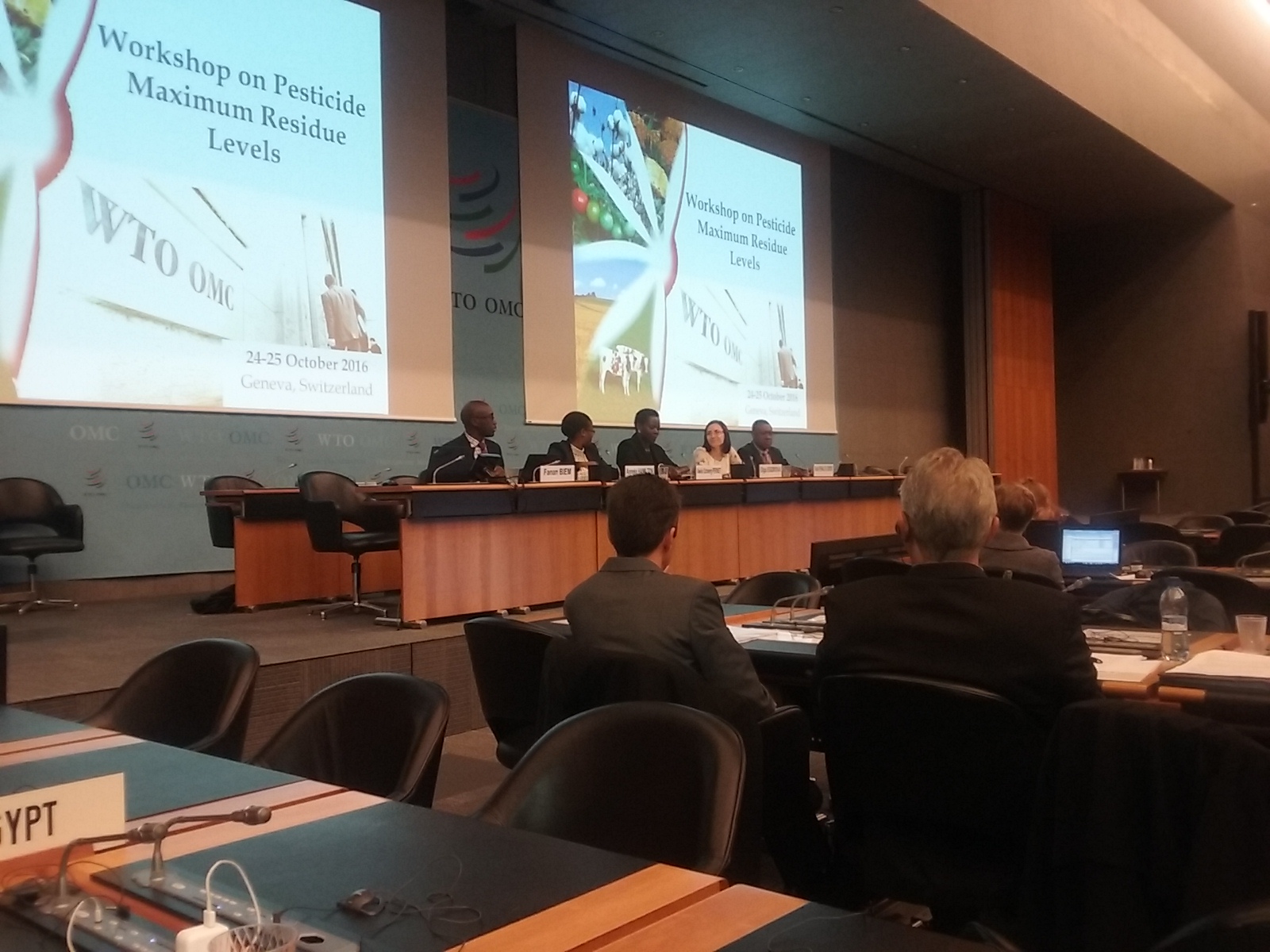Pesticide Maximum Residue Levels Workshop - WTO
Maximum residue levels (MRLs) for pesticide residues and residues of veterinary drugs are the maximum concentrations of residues to be legally permitted in or on a food. MRLs for pesticides may also be applicable to animal feeds.
MRLs are set by the Codex Alimentarius Commission. Draft MRLs for adoption by the Commission are elaborated by the relevant Codex committees on pesticides and veterinary drugs, on the basis of international, expert scientific advice.
WTO SPS workshop

The Chair of the Codex Alimentarius Commission Mrs Awilo Ochieng Pernet took part earlier this week in a workshop for World Trade Organization least-developed and developing country Members and Observers on Pesticide MRLs, in Geneva (24-25 October).
The workshops organised by the WTO aim to enhance the knowledge and expertise of government officials from WTO developing country Members and Observers, so they can better understand and implement the Sanitary and Phytosanitary Measures (SPS) Agreement. This Agreement deals with how governments can apply food safety and animal and plant health measures.
Expert panel
Mrs Ochieng Pernet moderated the session on the “Experiences in Implementing and Complying with Codex MRLs”. Dr Olga Egorova, Senior Researcher, F. F. Erisman Federal Scientific Centre of Hygiene, Rospotrebnadzor, Russian Federation gave a presentation on “The Harmonisation of Russian Pesticide MRLs with Codex Standards” and Mr Raúl Peralto Girón, Director, Agrifood Safety Department, Ministry of Agriculture, Dominican Republic gave a presentation on “The Impact of the Implementation of Codex MRLs on the Export of Fruits and Fresh Vegetables”.
"The WTO workshops are an excellent opportunity to talk directly to different countries about the practical realities of adopting Codex standards at the national level" said Ochieng Pernet.
The session explored WTO Member experiences in implementing existing Codex MRLs from an importer's perspective and provided additional insights into the difficulties and challenges faced by exporting countries in complying with MRLs.
Officers from the Codex Secretariat are also participating in SPS advanced training in Geneva in October and November with programmes in English and French. These sessions are a forum in which Members can enhance their knowledge of SPS issues and engage directly with experts to understand the practical realities of the SPS Agreement.
Links
WTO SPS events, workshops and training (click here)
At the heart of the Codex mandate are the core values of collaboration, inclusiveness, consensus building and transparency. Governmental and non-governmental, public and private organizations alike play a vital role in ensuring Codex texts are of the highest quality and based on sound science.
Codex would have little authority in the field of international standard setting if it did not welcome and acknowledge the valuable contributions made by observers. Expert technical bodies, industry and consumer associations
contribute to the standard-setting process in a spirit of openness, collaboration and transparency.
Intergovernmental organizations (IGOs) and international non-governmental organizations (NGOs) can apply for observer status in Codex in order to attend and put forward their views at every stage of the standard-setting process.
 Current Codex Alimentarius Commission
Current Codex Alimentarius Commission
Pesticide Maximum Residue Levels Workshop - WTO
Maximum residue levels (MRLs) for pesticide residues and residues of veterinary drugs are the maximum concentrations of residues to be legally permitted in or on a food. MRLs for pesticides may also be applicable to animal feeds.
MRLs are set by the Codex Alimentarius Commission. Draft MRLs for adoption by the Commission are elaborated by the relevant Codex committees on pesticides and veterinary drugs, on the basis of international, expert scientific advice.
WTO SPS workshop

The Chair of the Codex Alimentarius Commission Mrs Awilo Ochieng Pernet took part earlier this week in a workshop for World Trade Organization least-developed and developing country Members and Observers on Pesticide MRLs, in Geneva (24-25 October).
The workshops organised by the WTO aim to enhance the knowledge and expertise of government officials from WTO developing country Members and Observers, so they can better understand and implement the Sanitary and Phytosanitary Measures (SPS) Agreement. This Agreement deals with how governments can apply food safety and animal and plant health measures.
Expert panel
Mrs Ochieng Pernet moderated the session on the “Experiences in Implementing and Complying with Codex MRLs”. Dr Olga Egorova, Senior Researcher, F. F. Erisman Federal Scientific Centre of Hygiene, Rospotrebnadzor, Russian Federation gave a presentation on “The Harmonisation of Russian Pesticide MRLs with Codex Standards” and Mr Raúl Peralto Girón, Director, Agrifood Safety Department, Ministry of Agriculture, Dominican Republic gave a presentation on “The Impact of the Implementation of Codex MRLs on the Export of Fruits and Fresh Vegetables”.
"The WTO workshops are an excellent opportunity to talk directly to different countries about the practical realities of adopting Codex standards at the national level" said Ochieng Pernet.
The session explored WTO Member experiences in implementing existing Codex MRLs from an importer's perspective and provided additional insights into the difficulties and challenges faced by exporting countries in complying with MRLs.
Officers from the Codex Secretariat are also participating in SPS advanced training in Geneva in October and November with programmes in English and French. These sessions are a forum in which Members can enhance their knowledge of SPS issues and engage directly with experts to understand the practical realities of the SPS Agreement.
Links
WTO SPS events, workshops and training (click here)
 Codex and Observer
Codex and Observer
around the world since ancient times.
We might not always know where it comes from,
but we expect it to be available, safe and of good quality.









Leave a comment